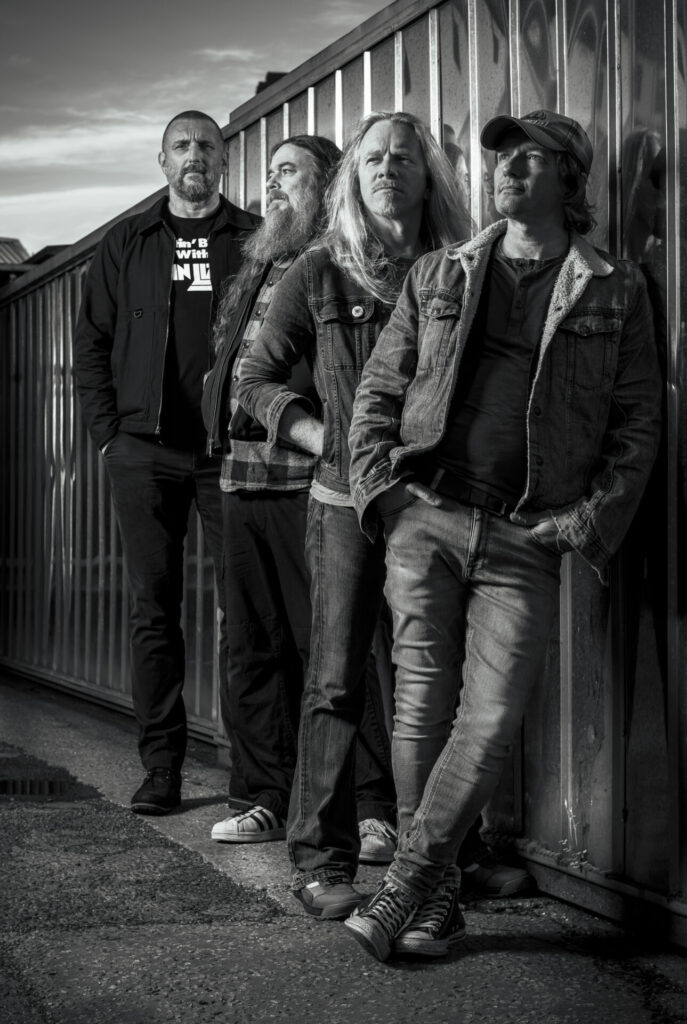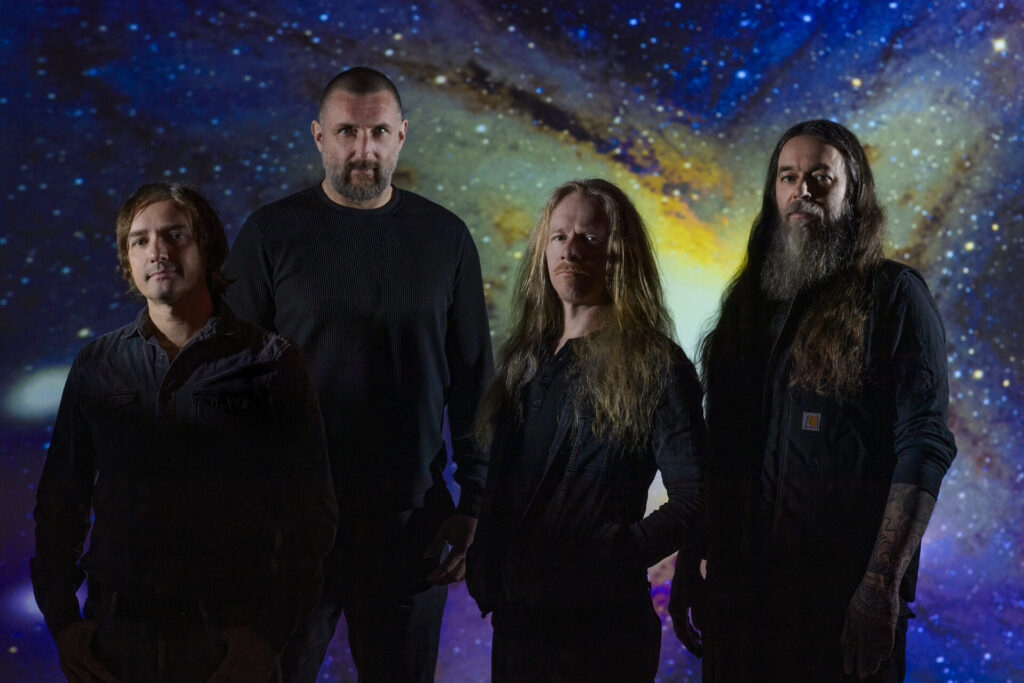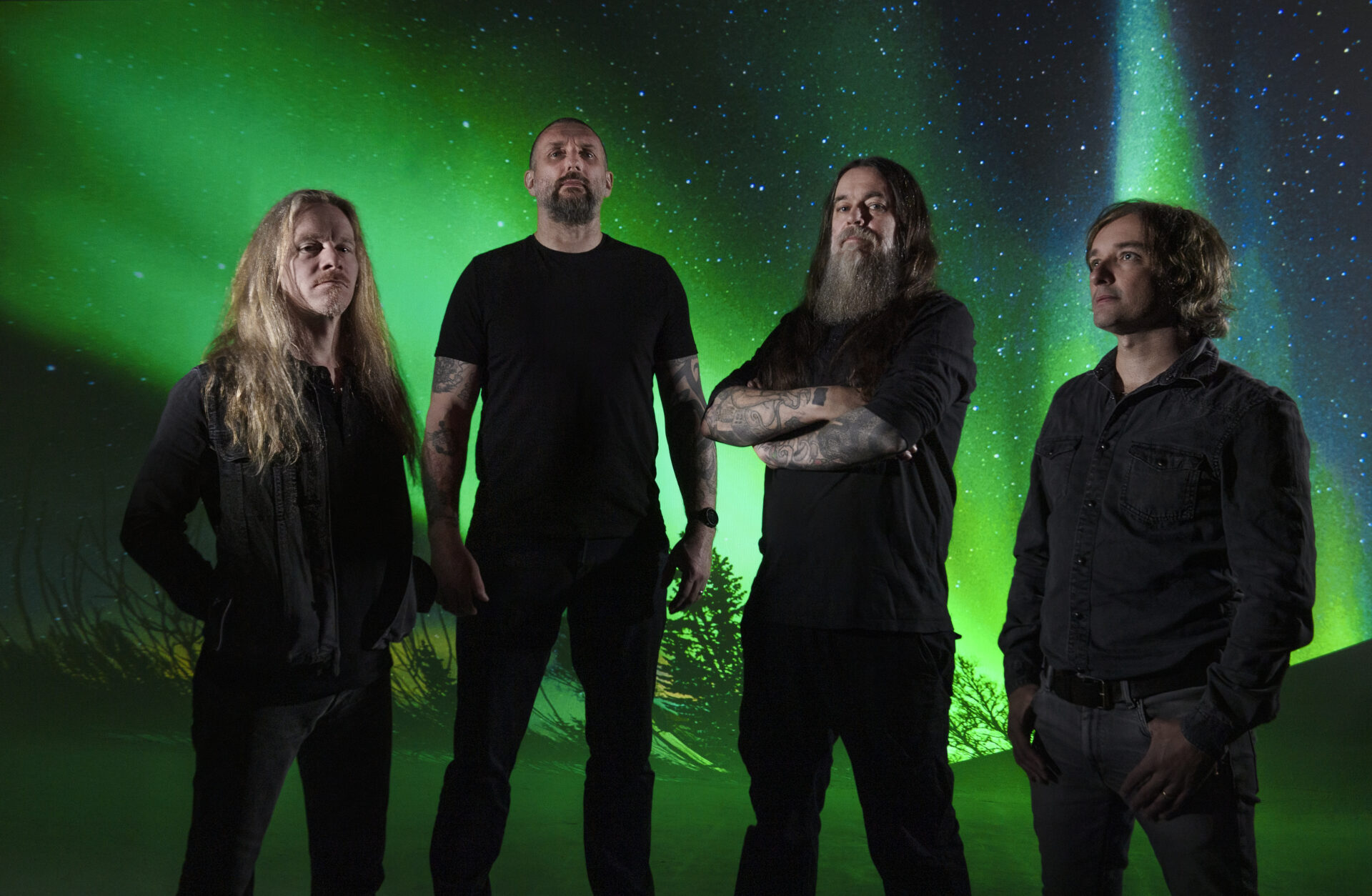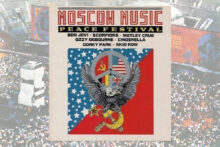In the spring of 2022, Ben Ward, singer of Orange Goblin, was granted Saruman’s wish. From Orange Goblin’s debut album, 1997’s Frequencies from Planet Ten, ‘Saruman’s Wish’ contained a message from Ward’s younger self to who he is now. The song spoke of “finding wisdom in the depths beyond our shame”.
‘Saruman’s Wish’ encapsulated Orange Goblin’s musical mission: bluesy, Sabbath-derived doom, injected with Motörhead-style accelerant. The reference to the malevolent wizard in The Lord Of The Rings was a bit of Tolkienian misdirection. Apart from elvish instrumental ‘Lothlorian’, also on Frequencies, Orange Goblin are not a particularly hobbit-friendly band.
Part of the stoner-rock explosion in the mid-nineties, Orange Goblin were never completely comfortable with the affiliation. But they were based in London, so whenever one of the scene’s bigger American bands toured, they were the go-to support act. Even then, rural contemporaries Electric Wizard made Orange Goblin puke with a homemade “hash lung” smoking device, and boasted that city dwellers couldn’t handle their marijuana.
“We never got the stoner tag because we never really smoked a lot of weed,” says Ward. “We were always more a drinking and speed and coke kind of band.”
Alcohol became synonymous with Orange Goblin. Drinking culture (“beercore”) was in their DNA. Their 1998 album, Time Travelling Blues, had a hidden track entitled ‘Sober Up’. The follow-up record, and what is widely considered a masterpiece of their early iteration, 2000’s The Big Black, went further. The hidden tracks were Ward’s slurred and belched voicemails, hopelessly sozzled, claiming (convincingly) to be the drunkest he’d ever been.
Ward was a heroic drinker. “Heroic” in the sense that British people like to describe big, intimidating alcoholic men, testing the boundaries within themselves and what is acceptable without. The type of heroism that equates to self-destruction: going over the top and getting shot to pieces charging the enemy. Ward has, in his words, “spilled more than most people have drunk in their time.”
But, Christ, what a frontman. At six feet five inches tall, with a crooked nose and a bear-like demeanour, he behaves onstage like he wants to crush the whole crowd in his embrace. He once high-fived an audience member so hard he dislocated the poor bloke’s shoulder.
Ward has led Orange Goblin at the vanguard of the British scene. In the vein of Lemmy and Lee Dorrian of Cathedral, Ward has used his rough-and-tumble, somewhat off-key vocal style to his advantage. He’s a great singer almost by force of charisma alone. But even at the time of The Big Black his lyrics betrayed he had a problem, and that it wasn’t going away. The song ‘Alcofuel’ said it all: “I’ve got one last chance to try and ease my pain/ But I’m sinking to the bottom of the bottle again”.
2020 promised a red-letter year for Orange Goblin, celebrating twenty-five years since their formation. They had big shows lined up at metal festivals Hellfest in France and Graspop in Belgium. But the pandemic shattered that promise, and everything was cancelled. Ward also lost his job as a booking agent at United Talent Agency. He received a decent pay-off, enough to keep him comfortable and indulging in the booze and other substances that soon seemed to subsume everything else he was doing.
The band improvised, delving into the archive to compile a Bandcamp-exclusive live album, Rough & Ready, Live & Loud. Composed of recordings from the Fuzz Club in Athens in 2016, the Sylak Open Air festival in France in 2019, and their Christmas show at London’s Koko in 2016, the proceeds from the album (and 100%-royalty Bandcamp Fridays) kept the band afloat.
Deciding that lockdown in London was simply too toxic an environment, Ward and his wife moved to the Roseland Peninsula on the south coast of Cornwall. Tesco was a ninety-minute round trip. The local garage shop closed at 7pm – too early for someone accustomed to living after midnight. Ward fell into an even more isolated cohort of drinkers. The lack of things to do exacerbated the debauchery. As beautiful as it was down there, after holding out a year, he fled back to London.
But the damage was done. Ward was having problems with his liver. He developed jaundice and had dark patches around his eyes. His weight ballooned to over 130 kilos. He was suffering from bouts of depression and became brittle; frequently aggressive and irritable. Soon, he came to recognise how disruptive and destructive his behaviour had become for his family, bandmates, and trying to start his own fledgling live booking business.
Then, late in March 2022, Saruman granted that wish. Ward saw the wisdom beyond his shame. He describes it as a “moment of clarity”. He vowed to stop drinking, and the rest. His pride is evident when he reels off the years, months and days since he last had a drink.

On ‘The Fire At The Centre Of The Earth Is Mine’, the opening song of Orange Goblin’s new album, Science, Not Fiction, Ward sings: “I will not apologise for the bastards that I’ve been/ And I will not romanticise all the darkness I have seen”. It is the crux of an album where his clarity of expression and delivery has taken his performance to a new place. Ward speaks of sobriety being a “revelation”, and the world opening up to him.
“I’m not going to apologise for what I’ve done, although I probably should, but apologising won’t change anything,” says Ward. “The only thing that can change anything now is me and making up for it.”
He concedes that he had a lot of good times wreaking havoc while he toured the world. But Ward is turning fifty later this year and that has sharpened the view. He now has a personal trainer, and frequently chugs a big bottle of water as we talk. He sneaks the occasional pull on his vape too, for balance. If he’s paying for exercise he figures he’s forced to stick with it. Ward is looking, to use another term British people like to apply to big men who have shed a load of timber, “svelte”.
Ward has also shaved his head and is initially unrecognisable from the Viking warrior of a few years ago. Last summer, I was waiting outside the entrance to a Wytch Hazel gig in north London when a huge man approached. Wytch Hazel are an excellent band Ward represents through his Route One Booking business. I wondered why a gangland enforcer was coming to a Christian-themed metal gig, until I realised it was him. Where he once drank, taking care of business and himself has become a fixation.
“I was always a really obsessive person, with anything,” he says. “My parents ran a pub in Ramsgate. So I grew up around alcohol and it just came to be a natural thing to me as a young man. You drink and you go to football. You drink with your mates and things like that. It’s just always been there. Especially being in the music industry, which is the only industry in the world where you arrive for work and there’s a fridge full of free beer and spirits. It’s hard not to get wrapped up in it all. So a lot of people said, it must be difficult [going sober], but it really wasn’t that difficult. I just had that willpower this time around.”
Compare footage of Orange Goblin playing the Bloodstock festival in 2021 and Freak Valley in 2023 to see Ward’s transformation for yourself. When he returned to playing live after he quit drinking he didn’t recognise the butterflies in his stomach before going onstage, something for years that he had numbed.
The alcoholic’s solution for pain is to numb it. Having given up drinking through force of will, I wonder whether Ward will take himself deeper now – to the source of the emotional issues that he was drowning out.
“I think I’ve definitely become more receptive to looking at it, because I always used to think that I didn’t have a really bad childhood,” he says. “Even though my parents split at an early age and went separate ways. I always used to look at it as a good thing, because I had two Christmases and that sort of thing. Now I’ve started to look into it and think maybe it did have some kind of psychological impact on me.”
As a teenager, Ward was quiet and shy, but found himself thrust into the limelight because of another talent: football. He was eager to please. The question “Am I enough?” became more urgent.
“I grew up in a very competitive world of playing football. I was a teenager and moved to London when I was fifteen to go and play for QPR for two years. That was a highly competitive world where you suffered knock-backs. And that could have an impact on your psychological well-being.”
Even at Orange Goblin’s commercial peak, when they quit their day jobs to play 161 shows in 2012 off the back of album A Eulogy For The Damned, songs like ‘Stand For Something’ sounded defensive: “I’ve hit the bottom far too many times to mention/ But I’ve paid for all my crimes”.
Under pressure to keep the momentum up, Ward admits the band rushed the follow-up, 2014’s Back From The Abyss. Songs of supposed self-empowerment, such as ‘Übermensch’, now sounded plain aggrieved: “They say I’m a man that drinks too much/ But in the grand scheme of things that’s the best of me/ You take me for everything that I’ve got/ And you keep coming back to attack the rest of me”.
For a ‘glass half empty’ personality, more than dedicated to finishing the contents of that glass, new song ‘Ascend The Negative’ breaks the cycle. Its second half has what Ward calls a Killing Joke-esque chant, as guitarist Joe Hoare whips up a furious sequence of fiery licks: “Face the demons, ease the pain/ Turn the pages and start to run/ A new tomorrow has just begun…”
Science, Not Fiction, the band’s tenth studio album, was produced by longtime Black Sabbath and Tony Iommi collaborator, Mike Exeter. For the first time, Orange Goblin let a producer in on pre-production when they were working through the songs in a Brighton studio last October. Exeter gave notes on arrangements and composition.
“We’ve never had that before,” says Ward. “We’ve probably told someone to fuck off in the past.”
But Orange Goblin were on best behaviour, knowing they couldn’t fumble their way through it like previous records: “With Mike reporting back to Tony Iommi what he’s up to, we want to make sure it’s good news,” laughs Ward.
They gave Exeter four albums as reference points: Black Sabbath’s Vol. 4, Monster Magnet’s Dopes To Infinity, Motörhead’s first album and Doremi Fasol Latido by Hawkwind. They built the record up “like a Lego set” as they tracked it.
“He knew from the outset what the vision was,” Ward says of Exeter. “You listen to the production on this record, there’s so much space in there and you can clearly identify every instrument.”
The pandemic years also saw a change in Orange Goblin’s lineup. Founding bass player Martyn Millard left in 2021. The band had always vowed to break up rather than replace original members. When guitarist Pete O’Malley left in 2004, they continued with only Hoare on guitar. But Millard insisted that Harry Armstrong replace him.
A supremely talented multi-instrumentalist, the band knew Armstrong long enough to consider him a member anyway. His pedigree from bands Hangnail (whose song ‘Summer Rain’ is one of the greatest stoner-rock songs ever), and latterly End Of Level Boss, shines through on Science, Not Fiction. He imbues the songs with the angularity of progressive thrashers Voivod and the circular rhythms of mid-seventies King Crimson.
If it’s anything, Science, Not Fiction is a deeply confident album. On ‘False Hope Diet’, Armstrong and Hoare lock into a Waltz-like 3/4 rhythm propelled by drummer Chris Turner. There’s diversity between the album’s songs and also within the songs. This was a defining feature of 2018’s The Wolf Bites Back, perhaps the inception of Ward’s turnaround, inspired by his wife’s own positivity in the face of Type 1 diabetes. As ‘False Hope Diet’ transitions into a regular 4/4 time signature, Turner’s drum breaks cross the bar line, giving it a woozy, psychedelic feeling.
It’s apt for a song about the other intoxicating epiphenomenon of the pandemic: conspiracy theories. In the alcoholic’s determined drive away from facing their demons, they can become susceptible to conspiracy theories. After all, they are easier than messy reality. Alcoholics like to “get messy”, but hate messiness.
Ironically, it was getting sober and pledging himself to explore life, the universe and everything, that Ward says “opened my eyes and my ears to conspiracy theories, and then getting involved in that and trying to form opinions on things.”
With the impact of lockdowns, the efficacy and negative side effects of vaccines, and alleged lab-leak origins of Covid-19, all still hotly debated (increasingly in the mainstream media), the song sticks its oar into the deep end: “Did you take your medicine and mystery vaccines/ For man-made epidemics from their corporate machines”.
It’s a typical don’t-believe-everything-you-read-or-see slice of heavy music, with musical switchups that mirror the confusion it describes.
“Now in hindsight, you think, wow, there could be some sort of truth in the fact that it was a man-made thing to control the population,” says Ward. “And governments wanted to instil this Orwellian sort of society where they knew exactly where we were and kept us almost like rats in cages during lockdown. Social distancing and all that sort of thing, and you only go out for a walk in the morning – it was crazy.”
“So, I’m not going to deny that there was a pandemic,” he hastens to add. “I’m not gonna say that there wasn’t, because a lot of people lost their lives.”

The counter-current on Science, Not Fiction is Ward’s belief in empirical reasoning. Much of the frustration in ‘False Hope Diet’ is that those who deny science in the name of religion are happy to prosecute religious wars based on “fairytale beliefs”. To Ward, it feels like their God fucked right off during Covid and has failed to reappear.
An atheist himself, Ward is keen to underline he is not anti-religion. This brings us to the question of higher power. Alcoholics Anonymous, with its strong Christian underpinning (overpinning, really), encourages those in recovery to find a higher power beyond the fragility of their own ego – to give them perspective. In Ward’s explanatory notes for the album, he says, “I believe that some good can come from people holding themselves accountable to a higher power”. But finding that higher power takes work.
“Now I’ve got to that place where I feel that I’ve conquered it,” Ward says of his alcoholism, “I would be curious to go back and talk to someone and see what else that would provide me with. See how that would influence my train of thought.”
Orange Goblin have always used drinking, their fascination with grindhouse cinema and pulp fiction (recent single ‘Cemetary Rats’ was inspired by the 1930s Weird Tales story ‘The Graveyard Rats’ by Henry Kuttner), and the aesthetics and conventions of heavy metal, to create a triple-lock on the door of their rocket ship burning up reality in its wake.
Now, Ward is using Orange Goblin’s music, not as an escape valve, but as a means to explore his inner self. The higher power that is heavy metal was around him all along. There’s a reason it looks and feels like a religion, with its live rituals, sacred recordings, priesthood of bands, and acolyte fans.
“In Orange Goblin, we relied heavily on that: the whole culture of drink and drugs, that in our lyrics previously we tied in with the whole fantasy and cosmic horror thing,” he says. “Because it was easy. It was just borrowing from books we’d read as kids or films we’d watched. But this time, I wanted to put some of my own thoughts and imagination into it. And that’s a lot easier when you’ve got that clarity of mind.”
With that comes the cynicism of confronting day-to-day existence. Ward says that ‘Fury Of A Patient Man’ is a song about “poking the bear”. The bear being the general population, stretched to breaking point. As for the upcoming General Election, he brings up the quotation often misattributed to Mark Twain: “If voting made any difference, they wouldn’t let us do it.”
“We’re so far in the shit now that whoever takes over is not going to be able to repair the damage that’s been done,” Ward says in resignation.
This is the grit in the oyster of clarity, sobriety and self-discovery in Science, Not Fiction. What if this new outlook, that is supposedly a cure-all, isn’t enough?
Final song ‘End Of Transmission’ closes the loop that started with Frequencies From Planet Ten. The twist being that it can’t quite close it. It decries a planet ruled over by “madmen” and “tyrants” and repeatedly asks, in an echo of Pink Floyd, “Is there anybody out there?” Orange Goblin are broadcasting from a murky psychic space, caught between humanity’s mind-forged manacles, and the unknowable void.
“‘End Of Transmission’, being the last song, is a retrospective that is looking back on the thirty years of madness that we’ve had,” says Ward. “It’s been a wild ride and that’s led us to where we are. We can’t go back and change things. I don’t believe it’s worth having regrets because everything happens for a reason. And the choices you make will dictate where you end up.”
It will be interesting to see what choices Ward makes next. There’s also the unanswered question of whether this is Orange Goblin’s final record. If it is, it might just be their finest. But as Ben Ward enters his fifties, thirty years after forming the band, it feels like his journey has only just begun.
He will have to get used to the churn in the pit of his stomach that comes with feeling things rawly – the challenge of being truly alive. Sobriety is no easy ride, and neither is reality. Best to follow the advice of the album’s final line that Ward roars into space: “Go buy a helmet, apocalypse now”.




